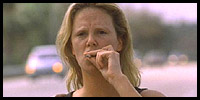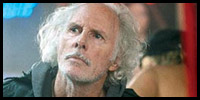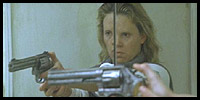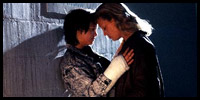
 |
|
Monster (2003) Cast: Charlize Theron, Christina Ricci, Bruce Dern, Annie Corley, Lee Tergesen, Scott Wilson, Marc Macaulay, Pruitt Taylor Vince, Marco St. John, Rus Blackwell, Tim Ware, Kaitlin Riley 2003 – 111 minutes Rated: Reviewed by Dustin Putman, January 10, 2004.  In the world of today, right is right, wrong is wrong, and someone who kills another person in cold blood is instantly viewed as an evil, irredeemable entity. It's really as simple as that, and there is little gray area when it comes to the popular census. Based on the true story of Aileen Wournos, a prostitute who was labeled "the first female serial killer" after murdering six johns' in the 1980s, "Monster" does not try to compensate Aileen's heinous actions, nor does it ask that she even be sympathetic. Instead, in her highly auspicious directing debut, Patty Jenkins' goal is for the viewer to simply understand how someone like Aileen might be pushed to commit such crimes, especially when the entire world around her becomes a consistent disappointment with few other options. The film's cumulative emotional effect is something of a passionate, unflinching tour de force.
In the world of today, right is right, wrong is wrong, and someone who kills another person in cold blood is instantly viewed as an evil, irredeemable entity. It's really as simple as that, and there is little gray area when it comes to the popular census. Based on the true story of Aileen Wournos, a prostitute who was labeled "the first female serial killer" after murdering six johns' in the 1980s, "Monster" does not try to compensate Aileen's heinous actions, nor does it ask that she even be sympathetic. Instead, in her highly auspicious directing debut, Patty Jenkins' goal is for the viewer to simply understand how someone like Aileen might be pushed to commit such crimes, especially when the entire world around her becomes a consistent disappointment with few other options. The film's cumulative emotional effect is something of a passionate, unflinching tour de force.
 A highway prostitute in Daytona Beach, Florida, since her early teens, thirty-something Aileen Wuornos (Charlize Theron) is an eternal lost soul about to end her own life when fate intervenes at a lowly gay bar in the form of 18-year-old Selby Wall (Christina Ricci). Selby is something of a lost soul herself, a lesbian still discovering her own sexuality who has been kicked out by her dad for coming out of the closet. Aileen defensively denies being gay when Selby approaches her, but after a few rounds of drinks, they have made a connection that quickly turns to genuine love.
A highway prostitute in Daytona Beach, Florida, since her early teens, thirty-something Aileen Wuornos (Charlize Theron) is an eternal lost soul about to end her own life when fate intervenes at a lowly gay bar in the form of 18-year-old Selby Wall (Christina Ricci). Selby is something of a lost soul herself, a lesbian still discovering her own sexuality who has been kicked out by her dad for coming out of the closet. Aileen defensively denies being gay when Selby approaches her, but after a few rounds of drinks, they have made a connection that quickly turns to genuine love.
 Aileen has never had another person care about her in the way that Selby does, and she clings to it, using her new relationship as a sign to go straight in her life and do away with hooking. Unfortunately, a legitimate job is not as easy to come by as Aileen expects, particularly with a police record attached to her name. When a hookup goes bad and Aileen is assaulted and raped, she manages to kill her attacker in self-defense. Miserable in her dead-end profession and frustrated with men, Aileen's dark unconscious is suddenly unleashed from this fatalistic incident. In its wake, Aileen gradually creates a bloodbath across central Florida that has no way of ending but badly.
Aileen has never had another person care about her in the way that Selby does, and she clings to it, using her new relationship as a sign to go straight in her life and do away with hooking. Unfortunately, a legitimate job is not as easy to come by as Aileen expects, particularly with a police record attached to her name. When a hookup goes bad and Aileen is assaulted and raped, she manages to kill her attacker in self-defense. Miserable in her dead-end profession and frustrated with men, Aileen's dark unconscious is suddenly unleashed from this fatalistic incident. In its wake, Aileen gradually creates a bloodbath across central Florida that has no way of ending but badly.
 "Monster" is not a serial killer movie in the sensational sense of the term, but one that feels all too real, and was. In her powerful, multifaceted portrait of Aileen Wournos, writer-director Patty Jenkins does not absolve Aileen of her crimes, but does make a convincing argument that her actions were at least partially the result of a life that was basically one bum deal after the next. By the time Aileen grows aspirations to do more with her life, her past actions have already sealed the deal on her grim fate from which there is no escape. In one painfully frank moment, Aileen goes to an employment agency and is told pointblank that with her police record the best she could ever possibly hope for is a minimum-wage factory job.
"Monster" is not a serial killer movie in the sensational sense of the term, but one that feels all too real, and was. In her powerful, multifaceted portrait of Aileen Wournos, writer-director Patty Jenkins does not absolve Aileen of her crimes, but does make a convincing argument that her actions were at least partially the result of a life that was basically one bum deal after the next. By the time Aileen grows aspirations to do more with her life, her past actions have already sealed the deal on her grim fate from which there is no escape. In one painfully frank moment, Aileen goes to an employment agency and is told pointblank that with her police record the best she could ever possibly hope for is a minimum-wage factory job.
 After she gets away with her self-defense murder (the newspapers state that there are no leads), Aileen comes to the conclusion that she doesn't need to demean herself in order to get paid; in her mind, it is easier and more convenient to simply dispose of her oily clients in exchange for their car and all of their money. In turning to killing, however, Aileen gets in way over her head, ultimately leading to the death of a well-meaning, would-be savior (Scott Wilson) who only wanted to help her out.
After she gets away with her self-defense murder (the newspapers state that there are no leads), Aileen comes to the conclusion that she doesn't need to demean herself in order to get paid; in her mind, it is easier and more convenient to simply dispose of her oily clients in exchange for their car and all of their money. In turning to killing, however, Aileen gets in way over her head, ultimately leading to the death of a well-meaning, would-be savior (Scott Wilson) who only wanted to help her out.
 There are no deserved words to describe the performance of Charlize Theron (2003's "The Italian Job"), one of the most gorgeous actresses in Hollywood, who has gone through a physical transformation unlike any, or many, others. Outside of her weight gain and the flawless make-up effects by Toni G, Theron's work is a fearless powerhouse. She does not simply mimic her real-life counterpart, but somehow has cosmically burrowed herself into Wuornos' own skin, becoming her. Theron has been very good in the past, but has never been given a role that allowed her to unveil how much acting talent and range she really had. From her body language, alternately self-imploding and filled with an underlying rage able to pop at any time, to her speech, to even the way she handles and smokes her cigarettes as if they are a utensil for showing off, Theron embodies from the inside out someone other than herself, and uncompromisingly does it with the depth, the foresight, and the humanity that can only be said of the best-ever performances in the history of cinema. Like Hilary Swank's in 1999's "Boys Don't Cry," an equally brilliant and tonally similar drama, Charlize Theron's performance as Aileen Wuornos is one for the record books.
There are no deserved words to describe the performance of Charlize Theron (2003's "The Italian Job"), one of the most gorgeous actresses in Hollywood, who has gone through a physical transformation unlike any, or many, others. Outside of her weight gain and the flawless make-up effects by Toni G, Theron's work is a fearless powerhouse. She does not simply mimic her real-life counterpart, but somehow has cosmically burrowed herself into Wuornos' own skin, becoming her. Theron has been very good in the past, but has never been given a role that allowed her to unveil how much acting talent and range she really had. From her body language, alternately self-imploding and filled with an underlying rage able to pop at any time, to her speech, to even the way she handles and smokes her cigarettes as if they are a utensil for showing off, Theron embodies from the inside out someone other than herself, and uncompromisingly does it with the depth, the foresight, and the humanity that can only be said of the best-ever performances in the history of cinema. Like Hilary Swank's in 1999's "Boys Don't Cry," an equally brilliant and tonally similar drama, Charlize Theron's performance as Aileen Wuornos is one for the record books.
 In the less showy but critical part of Selby Wall, Christina Ricci's (2003's "Anything Else") performance is a revelation that may be overlooked in favor of Theron's, but shouldn't be. In some ways, Ricci has the trickiest role. Selby is a quirky, somewhat gullible young woman still trying to find her place in the world, but she is not stupid, and suspects what Aileen has been doing long before she openly acknowledges it. How else to describe the constant change in car and the sudden increase in cash flow? Selby desperately loves Aileen, but as the stakes are raised she becomes frightened for the both of them, and realizes how in over her head she is. Like Theron, Ricci's every action, every piece of body language, and every line of dialogue paints a distinct, fleshed-out, richly drawn true original of a character. She is phenomenal.
In the less showy but critical part of Selby Wall, Christina Ricci's (2003's "Anything Else") performance is a revelation that may be overlooked in favor of Theron's, but shouldn't be. In some ways, Ricci has the trickiest role. Selby is a quirky, somewhat gullible young woman still trying to find her place in the world, but she is not stupid, and suspects what Aileen has been doing long before she openly acknowledges it. How else to describe the constant change in car and the sudden increase in cash flow? Selby desperately loves Aileen, but as the stakes are raised she becomes frightened for the both of them, and realizes how in over her head she is. Like Theron, Ricci's every action, every piece of body language, and every line of dialogue paints a distinct, fleshed-out, richly drawn true original of a character. She is phenomenal.
 "Monster," which gets its name from a giant carnival ferris wheel Aileen was scared to get on as a child, is the most humanistic portrayal of a serial killer I can recall having seen, filled with raw power and unsuspecting beauty. The production design by Edward T. McAvoy (2003's "Deliver Us from Eva"), costumes by Rhona Meyers, cinematography by Steven Bernstein (2001's "Corky Romano"), and music choices create such an unmistakable time and place that they effortlessly refuse to call attention to themselves. And the vital use of the song, "Don't Stop Believin'," by Journey, is poignant and magical bordering of downright incendiary.
"Monster," which gets its name from a giant carnival ferris wheel Aileen was scared to get on as a child, is the most humanistic portrayal of a serial killer I can recall having seen, filled with raw power and unsuspecting beauty. The production design by Edward T. McAvoy (2003's "Deliver Us from Eva"), costumes by Rhona Meyers, cinematography by Steven Bernstein (2001's "Corky Romano"), and music choices create such an unmistakable time and place that they effortlessly refuse to call attention to themselves. And the vital use of the song, "Don't Stop Believin'," by Journey, is poignant and magical bordering of downright incendiary.
 Executed by lethal injection in 2002, there is no doubt Aileen Wuornos was guilty of the crimes for which she was committed, but "Monster" heartbreakingly yearns for us to consider the circumstances that led to her downfall. We do not have to like Aileen Wuornos, director Jenkins seems to be saying, but we should at least consider her life's path as a tragedy in and of itself in a world that refused to give her a break. "Monster" is a fair, thought-provoking, unshakable masterpiece, one of 2003's most unforgettable in a decidedly lackluster year for the world of film.
Executed by lethal injection in 2002, there is no doubt Aileen Wuornos was guilty of the crimes for which she was committed, but "Monster" heartbreakingly yearns for us to consider the circumstances that led to her downfall. We do not have to like Aileen Wuornos, director Jenkins seems to be saying, but we should at least consider her life's path as a tragedy in and of itself in a world that refused to give her a break. "Monster" is a fair, thought-provoking, unshakable masterpiece, one of 2003's most unforgettable in a decidedly lackluster year for the world of film.
|
© 2003 by Dustin Putman |














